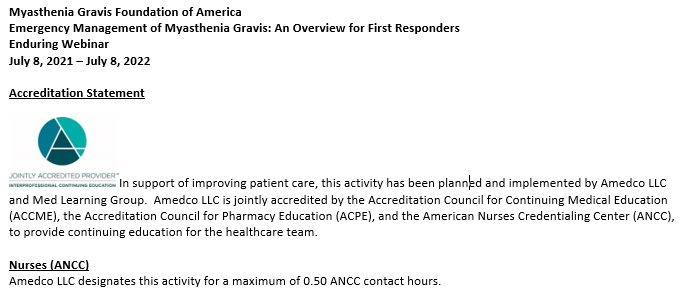Clinical Manifestations of Myasthenia Gravis (MG)
Myasthenia gravis is a rare neuromuscular disorder which causes fatigable weakness of voluntary muscles. Symptoms of myasthenia can include ptosis (eyelid drooping), disconjugate eye movements and double vision, slurred speech, difficulty chewing and swallowing, and neck, arm and leg weakness. When weakness is severe, there may be trouble walking and breathing. This muscle weakness may fluctuate over time and throughout the course of the day. Weakness can be mild or severe. Individuals with MG usually feel stronger in the morning or after a period of rest. Prolonged activity or repeated use of affected muscles can increase myasthenic weakness. Treatments for myasthenia include symptomatic therapy and/or immunosuppressant medications.
Cautionary Drugs
Certain medications and over the counter preparations may cause worsening of MG symptoms. Remember to tell any doctor or dentist about your MG diagnosis. It is important to check with your doctor before starting any new medication including over the counter medications or preparations.
See a complete list of cautionary drugs.
Myasthenic Crisis
A potentially life-threatening complication of myasthenia gravis. Respiratory failure occurs due to weakness of respiratory muscles and mechanical ventilation is required. Respiratory failure may also develop due to weakness of muscle that keep the airway open. BiPAP may be sufficient or the patient may need endotracheal intubation.
Careful assessment and monitoring is required as myasthenic crisis presents differently from other forms of respiratory failure. Prompt recognition of impending myasthenic crisis may prevent fulminant crisis from developing.
View this informative video from Deputy Fire Chief Michael Riley describing how EMTs handle MG patients in an emergency situation.
For more information, see our brochure MG Emergency Management for First Responders or view our webinar (information below):
Emergency Management of Myasthenia Gravis: An Overview for First Responders
Speakers:
Dr. Michael Hehir, University of Vermont Medical Center
Dr. Amanda Guidon, Massachusetts General Hospital
Session Description:
Myasthenia Gravis is a rare disease which causes fluctuating weakness in the voluntary muscle groups including breathing. MG may easily be mistaken for other neuromuscular diseases or the effects of substance abuse among other diagnoses. Myasthenic Crisis – a life threatening exacerbation of MG, can go unrecognized and possibly exacerbated by medical personnel unfamiliar with MG. This is a 30 minute presentation which covers the Emergency Management of Myasthenia Gravis for Nurses and First Responders. Points are illustrated by case examples. This presentation was developed by the Education Committee of the Myasthenia Gravis Foundation of America.
Duration: 30 minutes
Credit Available: 0.5 CNE for Nurses
Education Level: Introductory
Follow this link to access the webinar recording:
https://iopp.wistia.com/medias/7d9b39scfh
Follow THIS LINK to the LEARNER NOTIFICATION DOCUMENT

